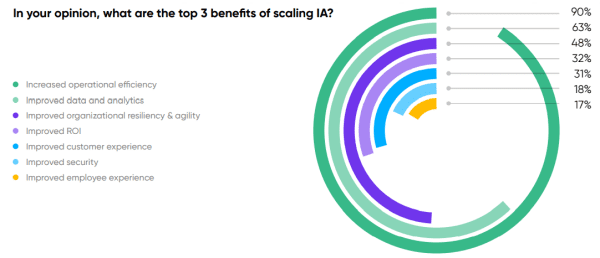Emerging Patterns in Industries Successfully Integrating Intelligent Automation

In the accelerating pace of the digital age, businesses are under constant pressure to innovate and adapt. At the center of this transformation lies intelligent automation (IA), which marries artificial intelligence and automation, presenting an unprecedented opportunity for businesses to scale and evolve. A report by the Intelligent Automation Network (IAN) reveals that 39% of organizations are already leveraging IA solutions.
Intelligent automation (IA), an amalgamation of artificial intelligence, machine learning, and robotic process automation, is redefining business paradigms. Not only does it streamline operations, but it also enhances the decision-making process. This article delves into the transformative potential of IA and its components, highlighting how it can be a catalyst for change in the modern business era.
The Evolution of Intelligent Automation
The journey from manual processes to traditional automation paved the way for advancements. It laid the groundwork for businesses to move from labor-intensive processes to automated systems. What propels IA ahead of its predecessors is its ability to self-learn, adapt, and improve. It transcends mere task execution, delving into realms of advanced decision-making. The melding of robotics, artificial intelligence (AI), and machine learning gives IA its distinct identity. Together, they enable systems to simulate human cognition and continually refine their operations.
Core Industries Embracing Intelligent Automation
As intelligent automation continues to permeate various industries, it brings a unique blend of efficiency and intelligence. Gartner predicts that organizations lower their operational costs by up to 30% by redesigning processes using hyperautomation technologies by 2024. Here, we explore the influence of IA across different sectors, underlining the specific aspects that have undergone a transformation.
Banking and Financial Services
Leveraging IA for evaluating transaction patterns and pinpointing discrepancies offers a new age of risk and fraud management. It also aids in offering personalized banking solutions and investment advice, thus revolutionizing customer service. The BFSI segment had captured 36% of the global share of the intelligent process automation market in 2022.
Healthcare
IA plays a pivotal role in predictive health assessments, refining diagnostic precision. Furthermore, tailoring treatment protocols based on data-driven insights ensures optimal patient outcomes, paving the way for personalized care plans.
Retail
The retail sector leverages IA for sophisticated inventory management and precise demand forecasting. It also enhances customer experiences through personalized shopping assistants and chatbot assistance, aiming for a seamless consumer journey.
Manufacturing
Predictive algorithms for timely equipment maintenance and guaranteed quality underscore the importance of enhancing maintenance in manufacturing. Real-time feedback loops optimize assembly processes, ensuring product excellence and heralding the era of intelligent assembly lines.
Supply Chain and Logistics
IA refines logistics, ensuring timely deliveries through efficient route planning, redefining the essence of optimized routes. Additionally, real-time product tracking and automated inventory management streamline operations, showcasing the future of automation in warehousing. AI-powered supply chains are 67% more effective than non-AI ones and the worth of AI applications in the global SCM market is expected to reach $17.5 billion by 2028.
Energy and Utilities
Smart grids facilitate efficient energy distribution, preempting equipment failures and marking the dawn of intelligent energy networks. Automated data analysis aids in optimizing consumption patterns and resource allocation, streamlining energy consumption.
EdTech & Publishing
In the realm of education and publishing, IA reshapes learning experiences and content dissemination. Adaptive learning platforms powered by AI cater to individual student needs, optimizing learning pathways. For publishers, content curation, recommendation engines, and audience engagement metrics are refined using intelligent automation, delivering tailored content experiences to readers.
Pivotal Patterns in Successful IA Integration
The integration of IA in businesses has manifested in several patterns that underline success and growth. Here, we detail these emerging patterns that have become central to successful IA integration.
Image Source: https://eco-cdn.iqpc.com/eco/images/channel_content/images/automation_ss13lnAoDV08K4BbCQKTC6g1vPyBGjn6Q8NE3VxZOHNE.png
IA assists in breaking down complex procedures into simpler tasks, minimizing manual interventions and repetitive operations, thereby saving time and reducing errors.
Data-Driven Decision Making
The integration of IA has marked a shift towards data-centric approaches. Real-time data insights and predictive analytics have become pivotal in forecasting market trends and identifying business challenges.
Enhanced Customer Experience
Crafting unique experiences based on individual consumer preferences is the hallmark of the hyper-personalization era. Moreover, it ensures swift grievance redressal and instant support, elevating the standard of customer service. By 2025, 95% of all live customer interactions are expected to be powered by AI with the user being unable to “spot the bot.”
Workforce Augmentation
IA is not replacing the workforce but augmenting it, fostering a collaborative environment where humans and machines complement each other’s strengths. This transition has also spurred upskilling initiatives, preparing employees for an AI-infused workplace.
Scalability and Flexibility
IA enables businesses to adapt quickly to changing market demands, maintaining operational efficiency even during rapid scaling phases. It brings about a level of flexibility that is vital in the contemporary business landscape. In fact, the Intelligent Automation report says that 85% organizations consider achieving scalability as the primary driver of AI adoption.
Continuous Learning and Evolution
IA systems have the unique capability to learn and evolve based on new data inputs. Machine learning plays a crucial role in this, perpetually enhancing processes and driving improvements.
Future Projections for Intelligent Automation
Looking ahead, IA is set to integrate seamlessly with emerging technologies like AR, VR, and quantum computing. This evolution hints at a future where automation transcends task-specific applications to foster holistic business transformations. However, this journey also brings forth ethical considerations, primarily revolving around balancing automation and human employment.
As we stand on the brink of a technological revolution spearheaded by IA, businesses must acknowledge and embrace the transformative potential of intelligent automation. Not doing so may risk obsolescence. Thus, it’s imperative for industries to anticipate, adapt, and evolve to remain relevant in the dynamic business ecosystem.
Recent Blogs






